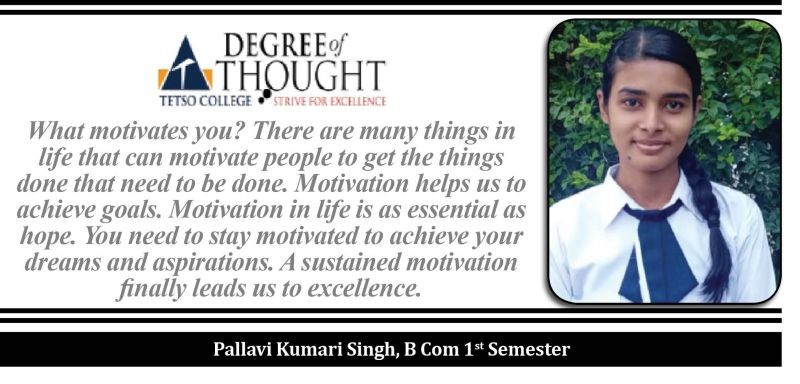
In life, we get motivated by various persons directly or indirectly. Motivation is the process that initiates, guides, and maintains goal oriented behaviour. It is what causes you to act, and it can be as simple as getting a glass of water to reduce thirst or reading a book to gain knowledge. Motivation involves the biological, emotional, social, and cognitive causes that activate behaviour in everyday usage. The term ’motivation’ is frequently used to describe why a person does something. It is the driving force behind human actions.
A good question to ponder upon is, what exactly lies behind the motivations for why we act? Psychologists have proposed different theories of motivation such as drive theory, instinct theory and humanistic theory such as Maslow’s hierarchy of needs. The reality is that there are many different forces that guide and direct our motivation.
Furthermore, it is vital to look into the different types of motivation. They are frequently described as intrinsic and extrinsic motivation. Intrinsic motivation occurs when people are internally motivated to do something because it either brings them pleasure, they think it is important, or they feel that what they are learning is significant. It has been shown that intrinsic motivation for education drops from grades 3-9 though the exact cause cannot be ascertained. Also, in younger students it has been shown that contextualising material that would otherwise be presented in an abstract manner increases the intrinsic motivation of these students. Extrinsic motivation comes into play when a student is compelled to do something or act a certain way because of factors external to him or her (like money or good grades). Cassandra B. Whyte researched and reported about the importance of locus of control and academic achievement. Students tending toward a more internal locus of control are more academically successful, thus encouraging curriculum and activity development with consideration of motivation theories.
Explaining motivation to a student's context, in regard to class work and assignments, a student might be motivated to excel in his or her particular area of study. Although If a student is forced to attend a required class not related to their area of interest and study, he/she might be motivated by the avoidance of receiving poor marks or negative feedback by the professor, which would be detrimental to their college career from an overall perspective. The avoidance would lead to completion of course work and material and actually benefit the student in the long run. This type of motivation shapes a person’s behaviour based on their own self-view and can influence their choices and responses from outside cues. The primary agent for this type of motivation is perception or perceived ability. Many theorists still can not agree whether achievement is based on mastering one’s skills or striving to promote a better self-image. Most research is still unable to determine whether these different types of motivation would result in different behaviours in the same environment.
Looking at the ongoing COVID-19 pandemic and students' motivation for learning, it has forced millions of children worldwide to learn at home. Recent reports showed that this had a negative impact on children’s motivation to learn. The current study investigated what factors were associated with a child’s motivation during the pandemic and how parents motivated their children to learn at home. A total of 1,041 parents from India filled out a close-ended survey to help shed light on the issues. The results confirmed that children in India were significantly less motivated to learn during (vs before) the pandemic and revealed that a child’s motivation to learn at home was associated with multiple factors, such as household income, parents’ employment status, child’s academic achievement, and parent’s enjoyment in homeschooling. In contrast, the availability and usage of various technological resources bore no relation to a child’s motivation. Finally, the current data showed that Indian parents most frequently used TV time, words of encouragement, and play/game time as motivators; the least popular motivators were money, new toys, and physical punishment. Exploratory analyses showed that a child’s motivation to learn tended to be lower when parents used more physical punishment to “motivate” their children. These findings were discussed in relation to public/education policies.
According to me, all people experience fluctuations in their motivation and willpower. Sometimes you might feel tied up and highly driven to reach your goals while at other times you might feel lightless or unsure of what you want or how to achieve it. Even if you are feeling a lack of motivation, there are steps you can take that will keep you moving forward. Some things you can do include- Adjust your goals to focus on things that really matter to you. If you’re tackling something, break it up in the smaller steps and try setting your sights on achieving that first step toward progress. Improve your confidence. Remind yourself about what you achieved in the past and where your strengths lie. If there are things you feel insecure about, try working on making improvements in those areas so that you feel more skilled and capable.
We will typically do our best when we have enough motivation. Motivation makes us do things correctly and perform well. We have higher odds of succeeding when we are fully inspired and put in effort. It will help us to give our best during every situation of life. So always work on your motivation.
Degree of Thought is a weekly community column initiated by Tetso College in partnership with The Morung Express. Degree of Thought will delve into the social, cultural, political and educational issues around us. The views expressed here do not reflect the opinion of the institution. Tetso College is a NAAC Accredited UGC recognised Commerce and Arts College. The editors are Dr Hewasa Lorin, Dr Aniruddha Babar, Nisha Dahiya and Meren. For feedback or comments please email: dot@tetsocollege.org






